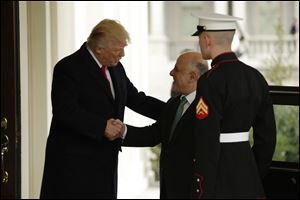
Trump meets with Iraqi premier as anti-IS policy takes shape
3/20/2017WASHINGTON — President Donald Trump is preparing for his first meeting with Iraq’s prime minister as the American leader shapes his policy for defeating the Islamic State group.

President Donald Trump greets Iraqi Prime Minister Haider al-Abadi upon his arrival to the White House in Washington.
Prime Minister Haider al-Abadi’s first visit to Washington since Trump’s inauguration comes before Trump hosts a 68-nation meeting geared toward advancing the fight against the militant group.
Trump campaigned on a promise to dramatically ramp up the assault on IS and has vowed to eradicate “radical Islamic terrorism.” So far, he has not indicated a dramatic change of course. Like President Barack Obama, Trump has not suggested any sharp increases in troop levels or in airstrikes against militant targets, looking to avoid giving off the image of an invading force.
During al-Abadi’s visit to Washington last year, the Iraqi premier worked to drum up greater financial and military support as he faced the daunting task of rebuilding cities destroyed in the fight against the Islamic State group. He also sought greater assistance to help the country confront a humanitarian crisis, with more than 4 million people displaced in the fighting.
As he departed Baghdad for the Monday afternoon meeting at the White House, al-Abadi declared in a video statement, “We are in the last chapter, the final stages to eliminate IS militarily in Iraq.”
But as Iraqi forces come closer to recapturing the city of Mosul — it’s militant group’s biggest stronghold in Iraq — the extent to which the Trump administration is willing to commit to efforts to rebuild Iraqi cities, many of them in ruins from the fighting, remains to be seen.
Trump’s budget proposal would cut by roughly 30 percent funding for the State Department and the U.S. Agency for International Development. Both contribute significantly to peacekeeping missions and development programs. How Iraq will be impacted by Trump’s approach isn’t known. Previous administrations have asserted a need for maintaining assistance to Iraq to counter the influence of neighboring Iran.
If the proposed budget is approved by Congress, more than $3 billion of the additional money being geared toward defense spending would be allocated to the fight against IS, including $2 billion for a fund that would give the Pentagon the discretion to direct those resources where needed to support the counter-IS strategy.
Al-Abadi arrives having already won one concession from Trump administration. The temporary ban on travelers from seven countries was rewritten to exclude Iraq, after several Iraqi officials and U.S. lawmakers objected to Iraq’s inclusion, noting the risks and sacrifices that many Iraqis made assisting U.S. troops during and after the 2003 U.S.-led invasion that toppled Saddam Hussein. The rewritten ban has been blocked by U.S. courts.
Trump may also find himself having to explain comments he made on his first day in office, when he vowed that the U.S. may get a chance to take Iraq’s oil as compensation for its efforts there — something al-Abadi, and later, Defense Secretary Jim Mattis, rebuffed.
Al-Abadi assumed power in 2014 after Iraq’s longtime prime minister, Nouri al-Maliki, was pushed out by his party for his failures to cap the surge of IS fighters. At one point, the radical Sunni Muslim group ruled about a third of Iraq.
Since then, Iraq’s military has seen significant military victories, with the help of an international coalition that has been assisting with airstrikes and weapons as well as a robust advise and assist operation.
The U.S. has sent about 5,200 U.S. forces in Iraq, but that number doesn’t include a few thousand forces who are there on temporary duty or don’t count in the military personnel accounting system for other reasons.
In neighboring Syria, the U.S. has more than 700 boots on the ground. There, the U.S. is shifting from working quietly behind the scenes on Syria’s toxic battlefield, turning instead toward overt displays of U.S. force in an attempt to shape the fight ahead of efforts to recapture the Islamic State’s de facto capital, Raqqa.